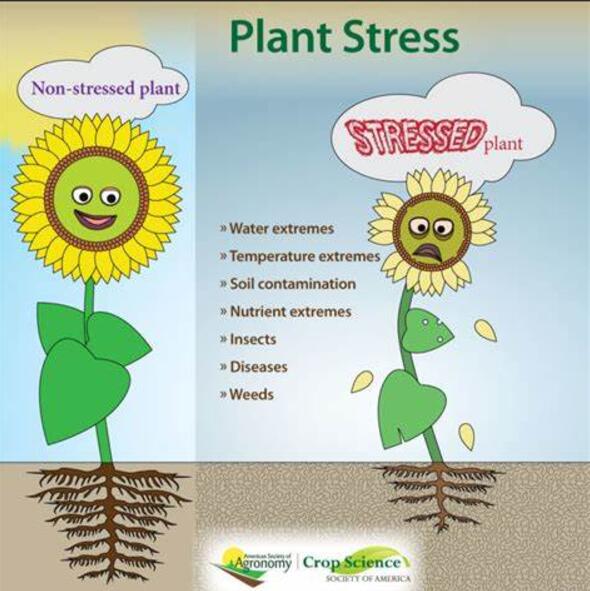利用与植物相关的微生物群:提高作物对非生物胁迫和问题土壤的抗逆性的可持续解决方案
IF 6.8
Q1 PLANT SCIENCES
引用次数: 0
摘要
干旱、盐碱和重金属中毒等非生物胁迫对可持续作物生产和全球粮食安全构成重大威胁。尽管现代品种在最佳条件下表现良好,但它们往往缺乏抵御环境压力所需的弹性。新出现的证据强调了植物相关微生物群落,包括促进植物生长的根瘤菌(PGPR)、内生菌和丛枝菌根真菌(AMF),在增强植物对非生物胁迫的抵御能力和恢复土壤健康方面的关键作用。这篇综述评估了集约化农业实践和非生物胁迫如何破坏根际微生物多样性和功能。然后,它探索了恢复和设计有益微生物种群的有前途的策略,如可持续农业实践、种子生物雾化、选择性微生物招募、纳米技术和精确微生物组工程。本文综合了微生物干预在改善问题土壤中植物生长和生产力方面的最新进展,强调了通过形态生理、生化和分子途径减轻胁迫影响。以Serendipita indica为研究对象,揭示了其在不同胁迫条件下增强植物抗逆性的广谱效应。最后,对目前阻碍微生物技术在异质野外环境中大规模应用的挑战和知识差距进行了批判性评估,并提出了针对特定应激情景定制微生物解决方案的未来研究方向。总的来说,这些见解使基于微生物组的战略成为增强作物抗灾能力和土壤健康的有力工具,为更可持续的农业未来铺平了道路。本文章由计算机程序翻译,如有差异,请以英文原文为准。
Harnessing the plant-associated microbiome: a sustainable solution for enhancing crop resilience to abiotic stresses and problematic soils
Abiotic stresses such as drought, salinity, and heavy metal toxicity pose significant threats to sustainable crop production and global food security. Although modern cultivars perform well under optimal conditions, they often lack the resilience needed to withstand environmental stresses. Emerging evidence highlights the critical role of plant-associated microbial communities, including plant growth-promoting rhizobacteria (PGPR), endophytes, and arbuscular mycorrhizal fungi (AMF), in enhancing plant resilience to abiotic stresses and restoring soil health. This review assesses how intensive agricultural practices and abiotic stresses disrupt rhizospheric microbial diversity and function. It then explores promising strategies to restore and engineer beneficial microbial populations, such as sustainable agricultural practices, seed biopriming, selective microbial recruitment, nanotechnology, and precision microbiome engineering. Recent advances in microbial interventions that improve plant growth and productivity in problematic soils are synthesized, emphasizing mitigation of stress impacts via morpho-physiological, biochemical, and molecular pathways. A focused case study on Serendipita indica illustrates its broad-spectrum efficacy in enhancing plant resilience under diverse stress conditions. Finally, current challenges and knowledge gaps that hinder large-scale application of microbial technologies in heterogeneous field environments are critically evaluated, along with proposed future research directions aimed at tailoring microbial solutions to specific stress scenarios. Collectively, these insights position microbiome-based strategies as powerful tools for enhancing crop resilience and soil health, paving the way for a more sustainable agricultural future.
求助全文
通过发布文献求助,成功后即可免费获取论文全文。
去求助
来源期刊

Plant Stress
PLANT SCIENCES-
CiteScore
5.20
自引率
8.00%
发文量
76
审稿时长
63 days
期刊介绍:
The journal Plant Stress deals with plant (or other photoautotrophs, such as algae, cyanobacteria and lichens) responses to abiotic and biotic stress factors that can result in limited growth and productivity. Such responses can be analyzed and described at a physiological, biochemical and molecular level. Experimental approaches/technologies aiming to improve growth and productivity with a potential for downstream validation under stress conditions will also be considered. Both fundamental and applied research manuscripts are welcome, provided that clear mechanistic hypotheses are made and descriptive approaches are avoided. In addition, high-quality review articles will also be considered, provided they follow a critical approach and stimulate thought for future research avenues.
Plant Stress welcomes high-quality manuscripts related (but not limited) to interactions between plants and:
Lack of water (drought) and excess (flooding),
Salinity stress,
Elevated temperature and/or low temperature (chilling and freezing),
Hypoxia and/or anoxia,
Mineral nutrient excess and/or deficiency,
Heavy metals and/or metalloids,
Plant priming (chemical, biological, physiological, nanomaterial, biostimulant) approaches for improved stress protection,
Viral, phytoplasma, bacterial and fungal plant-pathogen interactions.
The journal welcomes basic and applied research articles, as well as review articles and short communications. All submitted manuscripts will be subject to a thorough peer-reviewing process.
 求助内容:
求助内容: 应助结果提醒方式:
应助结果提醒方式:


